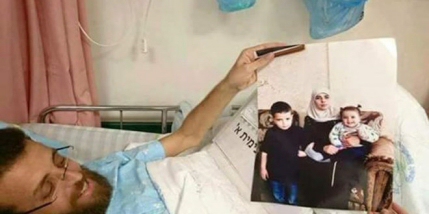Doctors in the Emek hospital, on Saturday, said that administrative prisoner, journalist Mohammad Al-Qeeq has been showing stroke symptoms 81 days into his hunger strike against arbitrary imprisonment, adding that he is now fighting death.Lawyer of the Palestinian commission of detainees and ex-detainees, Hiba Masalha, said, according to the PNN, that the hospital put its doctors on high alert due to the seriousness of al-Qeeq’s health condition, the Palestine Information Center (PIC) reported.
Masalha asserted that doctors in the hospital started to talk openly about serious complications happening to the prisoner, “who is fighting for his life.”
According to PIC, the lawyer also warned that the weak and fatigued body of the hunger striker cannot resist any stroke regardless of its nature, especially in that he has not been able to sleep for more than 48 hours because of acute pain.
On Friday, The International Solidarity Movement (ISM) created an online petition on Avaaz to demand the European Parliament (EU) to free Mohammad and to suspend its Association Agreement with Israel until it complies with international law.
According to WAFA, the Detainees and ex-Detainees Committee, Sunday, said that the Israeli high court ordered the military prosecution to respond to a request to move al-Qeeq to a hospital in Ramallah.
The committee said, in a press statement, that the high court granted the military prosecution until 5pm to reach a decision.
The committee demanded Israel to meet al-Qeeq’s demands, end his administrative detention and transfer him to a hospital in Ramallah to save his life and provide him with medical treatment.
Al-Qeeq was arrested on 21 November, 2015, when Israeli soldiers blew up the front door of his house and took him in for interrogation at Israel’s Kishon (Jalame) detention center.
His hunger-strike, that was started on 24 November 2015, came as a protest against administrative detention in Israeli prisons for six months without any charges or court.
He is one of 6,800 Palestinian political prisoners held by Israel, including 660 administrative detainees and 18 journalists. Nearly all are tortured during interrogations by Israeli occupation forces.
Under international law, administrative detention is only permissible as a last resort and in cases of an immediate threat.

